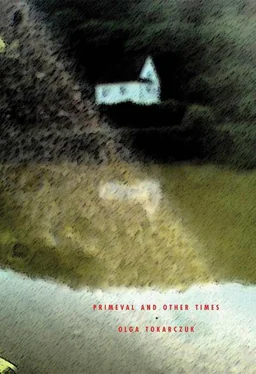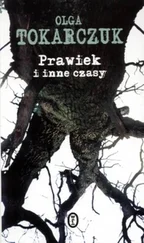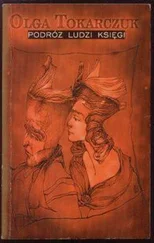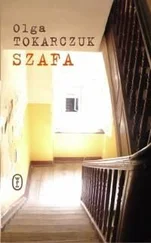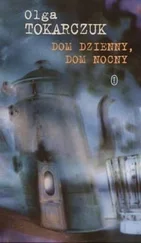The war caused chaos in the world. The forest at Przyjmy burned down, the Cossacks shot the Cherubins’ son, there weren’t enough men, there was no one to reap the fields, and there was nothing to eat.
Squire Popielski from Jeszkotle packed his belongings on carts and disappeared for several months. Then he came back. The Cossacks had looted his house and cellars. They had drunk his hundred-year-old wines. Old Boski, who saw it happen, said one wine was so old that they had sliced it with a bayonet like jelly.
Genowefa oversaw the mill while it was still working. She got up at dawn and supervised everything. She checked no one was late for work. Then, once everything was running in its rhythmical, noisy way, she felt the sudden surge of a wave of relief, warm as milk. Everything was safe, so she went home and made breakfast for the sleeping Misia.
In spring 1917, the mill stopped working. There was nothing to mill – people had eaten up all their stores of grain. Primeval lacked its familiar noise. The mill was the motor that drove the world, the machinery that set it in motion. Now all that was audible was the rushing of the River. Its strength went to waste. Genowefa walked about the empty mill and cried. She wandered like a ghost, like a white, floury lady. In the evenings she sat on the steps of her house and gazed at the mill. She dreamed about it at night. In her dreams the mill was a ship with white sails, the kind she had seen in books. Inside its wooden hulk it had enormous, grease-coated pistons that went back and forth. It puffed and panted. Heat belched from its interior. Genowefa desired it. She awoke from these dreams sweating and anxious. As soon as it was light, she got up and sewed her tapestry at the table.
During the flu epidemic of 1918, when the village boundaries were ploughed up, Cornspike came to the mill. Genowefa saw her circling it, staring in at the windows. She looked exhausted. She was thin and seemed very tall. Her fair hair had gone grey and covered her shoulders like a dirty shawl. Her clothes were torn.
Genowefa watched her from the kitchen, and when Cornspike peered in at the window, she withdrew. She was afraid of Cornspike. Everyone was afraid of Cornspike. Cornspike was mad, maybe sick too. She talked nonsense and swore. Now, as she circled the mill she looked like a hungry bitch.
Genowefa glanced at the icon of the Virgin Mary of Jeszkotle, crossed herself and went outside.
Cornspike turned towards her and Genowefa felt a shudder. What a terrible look that Cornspike had in her eyes.
“Let me into the mill,” she said.
Genowefa went back inside for the key. Without a word she opened the door.
Cornspike went into the cool shade ahead of her, and instantly fell to her knees to gather up the scattered, single grains and heaps of dust that had once been flour. She scooped up the grains with her slender fingers and stuffed them into her mouth.
Genowefa followed her every step of the way. From above, Cornspike’s stooping figure looked like a heap of rags. Once she had eaten her fill of grain, she sat down on the ground and began to cry. The tears flowed down her dirty face. Her eyes were closed and she was smiling. Genowefa felt a lump rise to her throat. Where was she living? Did she have any family? What had she done at Christmas? What had she eaten? She could see how frail her body was now, and remembered Cornspike from before the war. In those days she was a buxom, beautiful girl. Now she looked at her bare, wounded feet with toenails as tough as an animal’s claws. She reached out a hand to touch the grey hair. Just then Cornspike opened her eyes and looked straight into Genowefa’s eyes, not even into her eyes but straight into her soul, into her very centre. Genowefa withdrew her hand. They were not the eyes of a human being. She ran outside and felt relief as she saw her house, the hollyhocks, Misia’s little dress twinkling among the gooseberry bushes, and the curtains. She fetched a loaf of bread from indoors and went back to the mill.
Cornspike emerged from the darkness of the open door with a bundle full of grain. She was looking at something behind Genowefa’s back, and her face brightened.
“Sweetie-pie,” she said to Misia, who had come up to the fence.
“What happened to your child?”
“It died.”
Genowefa handed her the loaf of bread at arm’s length, but Cornspike came very close to her, and as she took the loaf, she pressed her lips to Genowefa’s mouth. Genowefa recoiled and jumped back. Cornspike burst out laughing. She put the loaf into her bundle. Misia began to cry.
“Don’t cry, sweetie-pie, your daddy’s on his way home to you,” muttered Cornspike and walked off towards the village.
Genowefa wiped her lips on her apron until they darkened.
That evening she found it hard to sleep. Cornspike couldn’t be wrong. Cornspike could tell the future, everyone knew about it.
And from the next day Genowefa started waiting. But not as she had done until now. Now she waited from one hour to the next. She put the potatoes under the eiderdown so they wouldn’t go cold too quickly. She made the bed. She poured water into a basin for shaving. She laid Michał’s clothes over a chair. She waited as if Michał had gone to Jeszkotle for tobacco and was coming straight back.
And so she waited all summer and autumn, and winter. She didn’t go far from home, and she didn’t go to church. In February, Squire Popielski came back and gave the mill some work. Where he got the grain for milling nobody knew. As manager and assistant, the squire recommended a man called Niedziela from Wola. Niedziela was quick and reliable. He bustled about between the top and bottom of the mill, shouting at the peasants. He wrote the number of bags milled in chalk on the wall. Whenever Genowefa came to the mill, Niedziela moved about even faster and shouted even louder, while stroking his sparse whiskers, which were nothing like Michał’s bushy moustache.
She was reluctant to go up there. Only on truly essential matters – if there was a mistake in the grain receipt, or if the machinery stopped.
Once, when she was looking for Niedziela, she saw the boys carrying the sacks. They were naked to the waist, and their upper bodies were coated in flour, like big pretzels. The sacks were shielding their heads, so they all looked identical. She could not see in them the young Serafin or Malak, but just men. The naked torsos riveted her gaze and made her feel anxious. She had to turn and look away.
One day Niedziela arrived with a Jewish boy. The boy was very young. He didn’t look more than seventeen. He had dark eyes and black curly hair. Genowefa saw his lips – large, with a finely drawn line, darker than any she had seen before.
“I’ve taken on another one,” said Niedziela, and told the boy to join the porters.
Genowefa talked to Niedziela absent-mindedly, and when he went off, she found an excuse to linger. She saw the boy take off his linen shirt, fold it carefully and hang it over the stair rail. She was moved when she saw his naked rib cage – slim, but muscular, and his swarthy skin, under which his blood was pulsating and his heart was beating. She went home, but from then on she often found a reason to go down to the gate, where the sacks of grain or flour were received and collected. Or she came at dinner time, when the men came down to eat. She looked at their flour-dusted shoulders, sinewy arms and their linen trousers, damp with sweat. Involuntarily her gaze sought out one among them, and when it found him, she felt a hot flush as the blood rushed to her face.
That boy, that Eli – as she heard him being called – aroused fear in her, anxiety and shame. At the sight of him her heart began to pound and her breathing became faster. She tried to watch coolly and indifferently. His dark, curling hair, strong nose and strange, dark lips. The dark, hairy atrium of his armpit as he wiped the sweat from his face. He swayed as he walked. Several times he met her gaze and was startled, like an animal that has come too close. Finally they bumped into each other in the narrow doorway. She smiled at him.
Читать дальше
